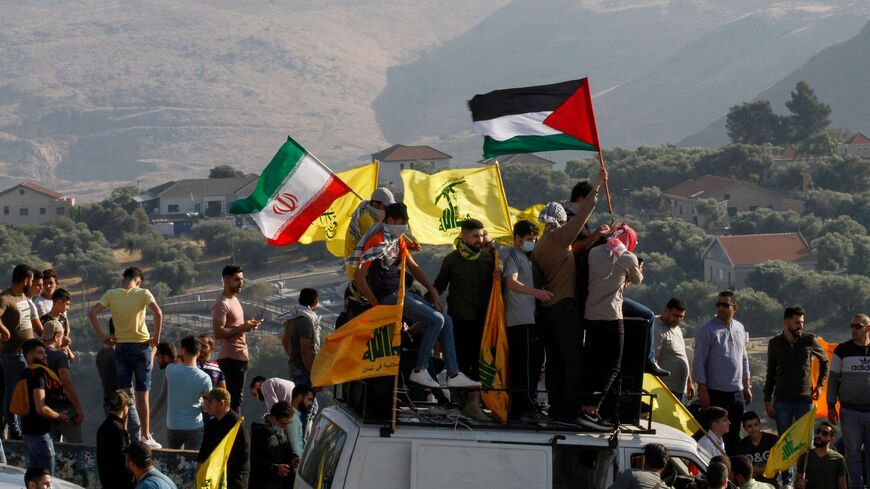TEL AVIV — Israel is currently focusing much of its security efforts on its border with Lebanon, where Hezbollah operatives are multiplying provocations against the Israel Defense Forces (IDF). On Thursday, for the second time in two weeks, the Iran-backed militant juggernaut posted a video showing the IDF chief of staff visiting the border region. Israel considers it a threatening message by the organization.
The buzz among Israeli security, political and media circles this summer is reminiscent of the chatter in spring 2006 about a potential flare-up along Israel’s northern border stemming from a “miscalculation” that could drag Syria and Israel, and perhaps Hezbollah, into an all-out war. Only in retrospect did it become clear that even as everyone was talking about a series of misunderstandings and miscalculations, the government of Prime Minister Ehud Olmert was already planning the September 2007 strike against the plutonium-powered nuclear reactor that Syria had built undetected by Israel until it was nearing completion.
These days, the Syrians are no longer building a nuclear reactor, and Hezbollah Secretary General Hassan Nasrallah is not yet eyeing nuclear technology, secure in his knowledge of Iran’s powerful backing of his Lebanese Shiite militia. Nonetheless, talk is heating up, and the realization that the sides are slowly but surely advancing toward an all-out military confrontation is becoming clearer.
Syria "will not be target"
It is unclear if Israel is again planning a pre-emptive military strike of any kind north of its border, but if it is, Syria will not be the target this time. At the moment, the threat posed to Israel by Nasrallah is far greater than the remnants of any Syrian threat. In fact, both Israel and Hezbollah are convinced of the other's offensive intentions. Israel being torn apart by internal conflict undermining its military’s cohesion and battle readiness, and Lebanon long being mired in internal chaos, economic collapse and social disintegration, have together given rise to the current volatile situation.
While the rumors and speculation in spring 2006 remained mostly behind closed doors, in summer 2023, the talk has gone public. Israeli Intelligence Directorate chief Maj. Gen. Aharon Haliva warned at the Herzliya Conference in May, "Nasrallah is close to making a mistake that could plunge the region into a big war. He is close to making this mistake from Lebanon or Syria.” In the months since, the Intelligence Directorate has issued many more assessments warning Israel’s political leaders about the danger of a significant war in the north and about the erosion of Israeli deterrence vis-à-vis Hezbollah, in particular, and the northern front, in general.
Israel and Hezbollah regularly threaten each other, with Nasrallah denigrating Israel in every speech, as ever, and various Israeli officials warning him against toying with the idea of dragging Israel into "a few days of fighting."
Such a limited clash is not an option, according to the messages Israel has been conveying to Hezbollah openly and covertly. In the case of a flare-up along the northern border, Israel would likely take advantage of the opportunity to restore its deterrence and teach Nasrallah and Hezbollah a lesson that will "send them back to the bunker for another 17 years," according to a senior Israeli security source, speaking to Al-Monitor on the condition of anonymity. The source was referring to the destruction Israel wreaked on Hezbollah in 2006 that sent Nasrallah into prolonged hiding.
Prime Minister Benjamin Netanyahu convened Israel’s top security officials on July 30 to consult about the increasing tensions with Hezbollah. The discussion focused on recent Hezbollah provocations, such as setting up two tents with armed fighters in a disputed border enclave, the strengthening of first-line positions along Lebanon's border with Israel, the incessant friction between Lebanese and Hezbollah fighters along the border fence with Israeli troops, and sabotage carried out along the fence in broad daylight. All these actions attest to the erosion of Israeli deterrence and growing Hezbollah daring.
Present at the security gathering were Defense Minister Yoav Gallant, IDF Chief of Staff Herzi Halevi and the heads of the National Security Council, the Mossad and the Shin Bet. A vague statement issued by Netanyahu’s office said the prime minister had accepted their recommendations and proposed plans of action. Political sources explained that the announcement means that Netanyahu is using the security agencies and army brass as cover for a decision to contain Hezbollah's provocations, for the time being.
Restoring deterrence
Nonetheless, a growing number of military, security and senior decision-makers understand that the growing tensions cannot be maintained for long.
"Something has to happen in order to shock the other side and restore stability to the northern border. If we expect Nasrallah to come to this realization on his own, things will end badly," a senior Israeli security source told Al-Monitor, speaking on the condition of anonymity. "Nasrallah is trapped in his own conception as [being] someone who knows Israel and is an expert on its domestic problems; if he thinks he can exploit the internal dispute in Israel for his own purposes, he will discover that it was a mistake, just as he was wrong in 2006”—when he initiated an incursion into Israeli territory, killed two soldiers and found himself embroiled in a vicious war.
Israel, for its part, is trapped in a different kind of conception, one based on the assumption that any real threat to the country’s security would unite the warring domestic factions, heal internal rifts and bury the disobedience of reserve forces refusing to serve a government that is turning Israel from a democracy into a dictatorship. Even now, in the midst of the deepest social chasm Israel has experienced in its 75-year history, there are those who claim that "one small war will solve everything."
Does Netanyahu have an interest in dispersing the countrywide protests roiling Israel for the past seven months by means of a "small war"? There are those who speculate that he may, but most dismiss such a scenario. Netanyahu knows that a war on the northern front will wreak havoc and destruction and damage on the Israeli side as well. That would make the pro-democracy protests the least of his problems. Not since 1967 has an Israeli prime minister benefitted from the wars and military actions that Israel initiated or into which it was dragged. Historical statistics in the Middle East are rarely wrong.








